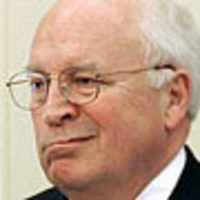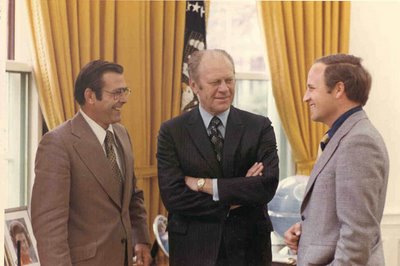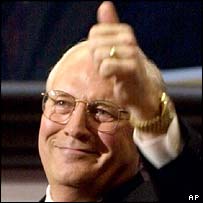Quote of the day: Maybe the reason even the amazing Joan Didion can't penetrate to the core of Dick Cheney is that there isn't one
isn't one'>isn't one'>isn't one'>isn't one'>>isn't one'>
 "He reached public life with every reason to believe that he would continue to both court failure and overcome it, take the lemons he seemed determined to pick for himself and make the lemonade, then spill it, let someone else clean it up."
"He reached public life with every reason to believe that he would continue to both court failure and overcome it, take the lemons he seemed determined to pick for himself and make the lemonade, then spill it, let someone else clean it up."--Joan Didion, from her article "Cheney: The Fatal Touch" in the new (Oct. 5) issue of The New York Review of Books
Joan Didion produced some remarkable writing in the wake of the tragedies that blew her life apart--the sudden loss of her husband, the equally remarkable writer John Gregory Dunne, even as they were in the process of losing their only child, their daughter Quintana. But it's good to see her back at work, casting her uniquely penetrating eye on our culture, and in particular our political culture, trying to make some sense of it. So naturally when the new NYRB arrived, her piece on Dick Cheney was the first thing I turned to.
 "It was in some ways predictable that the central player in the system of willed errors and reversals that is the Bush administration would turn out to be its vice president, Richard B. Cheney," she begins. "Here was a man with considerable practice in the reversal of his own errors. He was never a star. No one ever called him a natural. He reached public life with every reason to believe that he would continue to both court failure and overcome it, take the lemons he seemed determined to pick for himself and make the lemonade, then spill it, let someone else clean it up."
"It was in some ways predictable that the central player in the system of willed errors and reversals that is the Bush administration would turn out to be its vice president, Richard B. Cheney," she begins. "Here was a man with considerable practice in the reversal of his own errors. He was never a star. No one ever called him a natural. He reached public life with every reason to believe that he would continue to both court failure and overcome it, take the lemons he seemed determined to pick for himself and make the lemonade, then spill it, let someone else clean it up." White House Deputy Chief of Staff Dick Cheney (right) with Chief of Staff Donald Rumsfeld and President Gerald Ford (April 1975)
White House Deputy Chief of Staff Dick Cheney (right) with Chief of Staff Donald Rumsfeld and President Gerald Ford (April 1975)Didion brings her customary insight and thoroughness to bear tracing the outlines of Cheney's dismal career, culminating in such improbable heights. It's tough stuff, mostly familiar, but put together with the sharpness and clarity we expect of her. And there are tantalizing moments, like this one:
The personality that springs to mind is that of the ninth-grade bully in the junior high lunchroom, the one sprawled in the letter jacket so the seventh-graders must step over his feet. There was in a June letter from Senator Arlen Specter to Cheney, made public by Specter, an image that eerily conveyed just that: "I was surprised, to say the least, that you sought to influence, really determine, the action of the Committee without calling me first, or at least calling me at some point," Specter wrote, referring to actions Cheney had taken to block his Judiciary Committee from conducting a hearing on NSA surveillance. "This was especially perplexing since we both attended the Republican Senators caucus lunch yesterday and I walked directly in front of you on at least two occasions en route from the buffet to my table."
And yet, we realize that we still haven't learned much about Cheney. (This does suggest that Didion might at some point want to train her powers on the strange phenomenon of Senator Specter.) Later, Didion makes a point of establishing that it isn't really even right to propose that Cheney is especially ideologically driven, noting that he doesn't really seem to have much ideology beyond the primitive Mountain State conservatism he grew into. He made common cause with the neocons over Iraq, but he has never been one of them.
About the closest Didion comes to finding something at the "core" of Dick Cheney grows out of her fascination with the famous phrase "other priorities" he used to explain his decision to use all legal means available to him to avoid military service in Vietnam. "The words stuck because they resonated, and still do," she says. In the end, she says, the phrase "still nags," because--
 it suggests other agendas, undisclosed strategies. We had watched this White House effect the regulatory changes that would systematically dismantle consumer and workplace and environmental protections. We had watched this White House run up the deficits that ensured that the conservative dream of rolling back government will necessarily take place, because there will be no money left to pay for it. We had heard the Vice President speak as recently as January 2004 about our need to recolonize the world, build bases, "warm bases, bases we can fall in on, on a crisis and have present the capabilities we need to operate from."
it suggests other agendas, undisclosed strategies. We had watched this White House effect the regulatory changes that would systematically dismantle consumer and workplace and environmental protections. We had watched this White House run up the deficits that ensured that the conservative dream of rolling back government will necessarily take place, because there will be no money left to pay for it. We had heard the Vice President speak as recently as January 2004 about our need to recolonize the world, build bases, "warm bases, bases we can fall in on, on a crisis and have present the capabilities we need to operate from.""Other priorities" suggests what the Vice President might have meant when he and the President talked about the "different kind of war," the war in which "our goal will not be achieved overnight." As a member of the House during the cold war and then as secretary of defense during the Gulf War and then as CEO of Halliburton, the Vice President had seen up close the way in which a war in which "our goal will not be achieved overnight" could facilitate the flow of assets from the government to the private sector and back to whoever in Washington greases the valves. "The first person to greet our soldiers as they arrive in the Balkans and the last one to wave good-bye is one of our employees," as he put it during his Halliburton period.
[Didion has already noted that when Cheney was first approached about becoming George W. Bush's running mate in the early summer of 2000, he was "then five years into his job at Halliburton, for which he had collected $44 million (plus deferments and stock options) and during which the Halliburton subsidiary Brown & Root had billed the United States $2 billion for services in Bosnia and Kosovo."]
He had also seen up close the political advantage to which such a war could be put. "And so if there's a backlash pending I think the backlash is going to be against those who are suggesting somehow that we shouldn't take these steps in order to protect the country," as he put it when asked last December if his assumption of presidential autonomy might not provoke a congressional backlash. In the apparently higher interest of consolidating that political advantage he had made misrepresentations that facilitated a war that promised to further destabilize the Middle East. He had compromised both America's image in the world and its image of itself.
Maybe in the end, this is all there is to Cheney: the naked greed, and a lust for power. I just have a feeling that if Joan Didion can't find anything there, there's nothing to be found.
UPDATE: The article is now available (free) online
And the link above should take you to it. Just to be safe, here it is again!



1 Comments:
keninny says "Maybe in the end, this is all there is to Cheney: the naked greed, and a lust for power. I just have a feeling that if Joan Didion can't find anything there, there's nothing to be found."
and truer words have not been spoken! classic stuff there!
lol
Post a Comment
<< Home